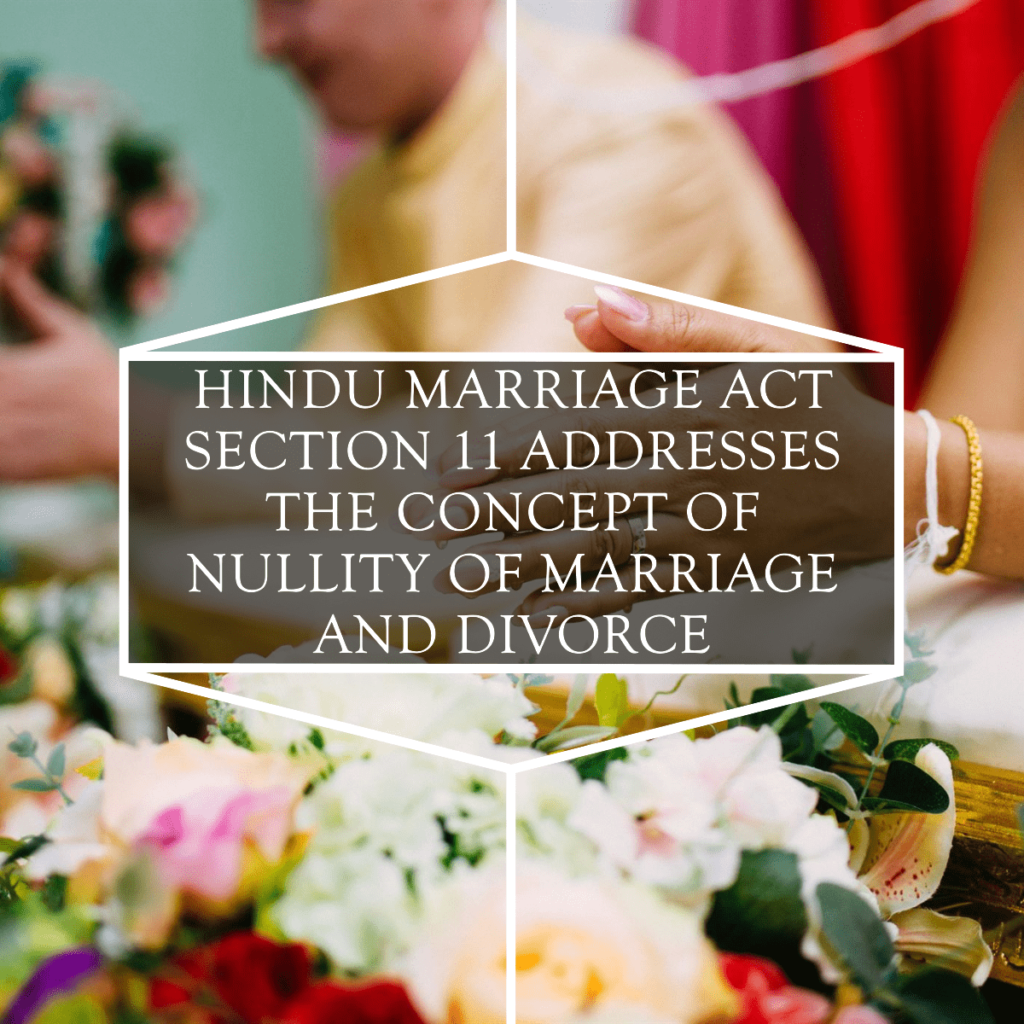Introduction:
Hindu Marriage Act Section 11: The Hindu Marriage Act, 1955, is a crucial piece of legislation that governs the solemnization and dissolution of marriages among Hindus in India. Hindu Marriage Act Section 11 addresses the concept of nullity of marriage and divorce. In this comprehensive guide. We will delve into the intricacies of Section 11 and understand its scope, applicability, and the various aspects it encompasses.

Scope of Hindu Marriage Act Section 11:
Hindu Marriage Act Section 11 exclusively applies to marriages solemnized after the commencement of the Act. This section specifically deals with post-Act marriages, highlighting that if subsequent marriages contravene the Act’s specific conditions. They can declare them null and void. It’s crucial to grasp that a marriage conducted under Section 11 is null and void from the outset, holding legal significance
Applicability of Hindu Marriage Act Section 11:
It is beyond doubt that marriages dissolved under Hindu Marriage Act Section 11, 12, and 13 by the grant of a decree of nullity or divorce come under the purview of Section 11. In such cases, the marital relationship is dissolved or brought to an end. It is significant to interpret Section 15 in the context of Section 28. Which provides for the right of appeal in proceedings under the Act. It is crucial to recognize that Section 28 confers an unqualified and unrestricted right of appeal against all decrees in any proceedings under the Act, including those under Sections 11 and 12.
The interpretation of Section 15 should be consistent with Section 28. This phrase ‘marriage has been dissolved by a decree of divorce’ signifies that a court decree has terminated the marital relationship.
Annulment of Marriage:
In Jasbir Singh v. Inderjit Kaur, the court noted a significant observation. The appellant-husband had initially filed a petition under Section 12 of the Act. Seeking the annulment of the marriage through a decree of nullity because they were unaware of the respondent’s prior marriage. However, as the case advanced, the husband converted the petition into Hindu Marriage Act Section 11, claiming that the respondent had married another person, Lachhman Singh, without obtaining a legally valid divorce.
In this case, the court examined evidence, including customs, to decide if the marriage should be annulled. They found a custom among Jat Sikhs for mutual consent divorce, backed by documentary evidence.
The court concluded that Section 13 of the Hindu Marriage Act allows for the dissolution of a Hindu marriage, as well as dissolution under any other special enactment or in accordance with any custom applicable to the parties. It is important to recognize the significance of customs in determining the validity of marriages under the Act.
Declaration of Marriage:
Section 11 of the Act declares any marriage conducted after its commencement null and void if it violates conditions in Section 5 (i), (iv), or (v). The Act clearly outlines the essential conditions for a legal marriage, and marriages breaking these conditions become null and void.
Regarding the age as a condition for marriage, it is specified in clause (iii) of Section 5 of the Act. This clause emphasizes that age alone does not constitute a valid ground for declaring a marriage null and void under Hindu Marriage Act Section 11. Furthermore, Section 12 of the Act covers various grounds for voidable marriages, but the age of the parties is not one of them. Instead, Section 12(1)(c) focuses on consent and whether it was obtained by force or fraud. Therefore, it is imperative to understand that age is not a sufficient ground for seeking the annulment of a marriage under Section 11 or Section 12 of the Act.
Decree for Dissolution of Marriage by Mutual Consent:
Sometimes, during the course of legal proceedings, the parties may come to an agreement to dissolve their marriage by mutual consent. In such cases, following the due process is essential to ensure the protection of both parties’ interests.
In a recent case, the parties agreed to obtain a divorce by mutual consent. The court granted them permission to amend their petition under the Hindu Marriage Act to proceed with a divorce by mutual consent under Section 13-B. The court recognized the long-standing separation and the inability of the parties to reconcile.
This case illustrates the importance of adhering to the formal procedures for divorce by mutual consent under the Act. The court granted the divorce based on the consent terms filed by the parties, emphasizing that they took into account the financial aspects and other considerations.
Decree of Divorce:
It can be challenging to pass an ex parte judgment against a spouse who has not filed a written statement. Especially when the allegations of nullity and divorce are serious. In such cases, it is essential for the court to consider the financial aspects and provide for the necessary expenses of the proceedings.
Section 24 of the Act addresses maintenance and the provision of necessary expenses, which one should not overlook. The court’s decision must consider the financial circumstances of both parties, ensuring a fair and just outcome.
Judicial Separation and Maintenance:
In a case involving allegations of desertion and cruelty, the court ruled that the defendant’s conduct forced the plaintiff to leave, constituting constructive desertion. It is essential to understand that desertion does not merely involve physical departure; it can result from the breakdown of the matrimonial home due to the actions of one spouse.
Furthermore, the term “unchaste life” in Section 18 of the Act refers to adultery. The court clarified that a woman’s interactions with friends, relatives, or strangers do not constitute unchaste behavior. It is crucial to distinguish between legitimate social interactions and adultery when evaluating a spouse’s behavior.
The court granted judicial separation and maintenance to the plaintiff in this case. Taking into account the financial capabilities of the parties involved. It is essential to consider the financial aspects of maintenance awards and to ensure that the judgment is fair and just.
Validity and Legality of Marriage:
In some cases, disputes may arise regarding the validity and legality of a marriage. It is important to note that a third party cannot raise such disputes. The parties directly involved in the marriage should be the ones to address issues of validity and legality.
Void Marriage Under Hindu Marriage Act Section 11:
When a marriage faces a challenge based on allegations of non-conformity with Hindu Customary Rites or the Hindu Marriage Act. The burden of proof rests with the party asserting that the marriage adhered to such customs and rites. Without evidence supporting this claim, the marriage cannot be considered valid.
Void and Voidable Marriages:
Clause (i) of Section 5 of the Hindu Marriage Act states that a lawful marriage requires neither party to have a living spouse at the time of marriage. Any violation of this condition renders the marriage null and void.
It’s crucial to recognize the Act’s overriding effect. Preventing the reliance on earlier Hindu law or customs conflicting with its provisions to validate such marriages.
Section 12 of the Act applies to other categories of marriages, excluding those violating Section 5(i) of the Act. These cases are not void from the start and remain valid unless the specified conditions are met. And the aggrieved party exercises their right to void the marriage.
Conclusion Hindu Marriage Act Section 11:
Section 11 of the Hindu Marriage Act is pivotal. It deals with marriage nullity and divorce, particularly when marriages contravene Act conditions. Understanding scope, applicability, and various aspects is crucial. It helps navigate marital law complexities in India.
Parties involved in legal proceedings must, therefore, adhere to formal procedures and financial considerations to ensure a fair and just outcome in matters of divorce, annulment, and maintenance. Furthermore, strict compliance with the Act’s provisions is essential. In addition, the validity of customs and traditions requires credible evidence. In light of these considerations, this comprehensive guide offers valuable insights into the intricacies of Section 11 and its relevance in contemporary legal practice.



Leave a Reply